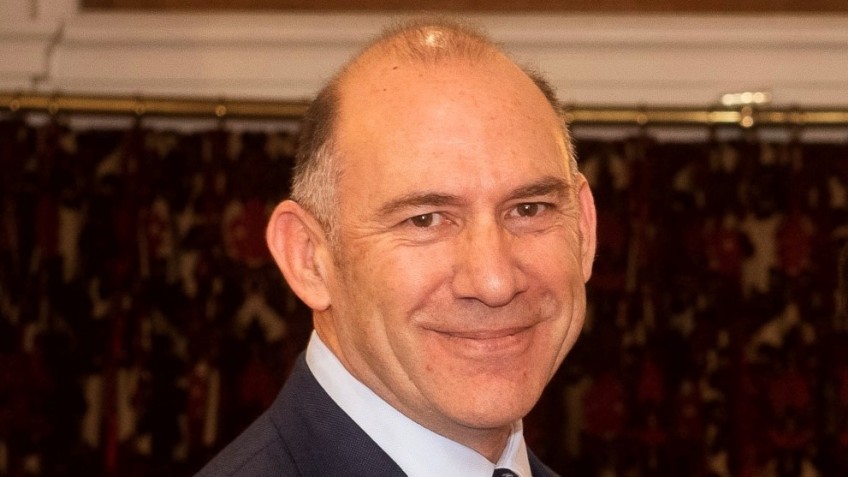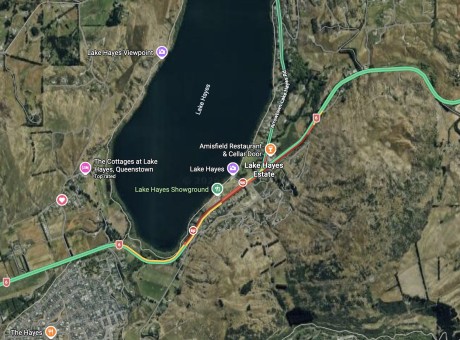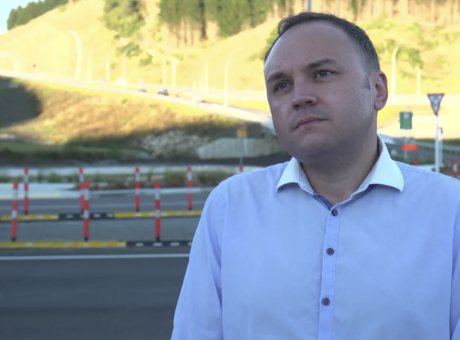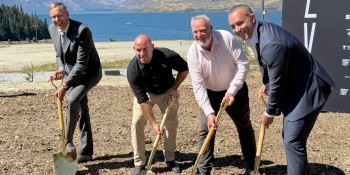CODC ex-military CEO welcomes battle over Cromwell assets

Peter Kelly, the new chief executive of the Central Otago District Council and the man behind what's fast become a controversial proposal to rein in the decision making power of community boards in the district, reckons just because something has always been done a particular way doesn't mean it should continue that way forever.
The comments were made in response to revelations from former Cromwell decision makers the current community board delegations were fiercely negotiated decades back when the then borough council was forced to amalgamate into the newly recreated Central Otago District Council.
In the public forum of Monday's Cromwell Community Board meeting, former elected member Werner Murray presented information on a Memorandum of Understanding entered into by the Crown and the Cromwell Borough Council, who unsuccessfully resisted becoming a part of the Central Otago District, making a case instead to join with Wānaka and Queenstown.

A newspaper clipping from 1989, when local government reforms were underway.
After in depth interviews this month with former elected members and leaders of the Cromwell Borough Council, Mr Werner concludes the genesis for "the long-standing practise of the Cromwell Community Board having the delegated authority, that is now under threat, which grants the community board the control over the acquisition, disposal of land and use of funds raised from this for the benefit of the Cromwell community" is in this political back and forth of the late 1980s, in the days of dam building and local government reforms.
It is Mr Murray's view understanding and having time to reflect on this historical context is vital if the council wants to move forward with its community on board.
However Mr Kelly is pushing back at any suggestion as a newcomer to the district he has inadvertently opened a can of worms with his bold proposal just months into taking over the chief executive role.
But was he aware of exactly what was at stake, or the context in which the delegations he is swiftly seeking to change were first nutted out, when he started the ball rolling?
He admits to having received a bit of a "history lesson" in recent weeks, but challenges how much part decades-old decisions should play in 2024.
"I have not been able to find a legal document that enshrines what was broadly agreed to back in 1989. There's lots of anecdotal discussions about it."
The only legal framework he worries himself with is the Local Government Act.
"So the information, the historical relevance, and all that sort of stuff, is really interesting and nice, useful context and background, but in no way are they legally binding."
Community boards are something of a novelty for Mr Kelly, the former boss at the Upper Hutt City Council.
"Where I came from, we didn't have community boards...so you just deal with council and the various committees of council."
He says on arrival in Central Otago he spent some time getting "a sense of understanding of the role of community boards", and found their decision making power was "in stark contrast" to community boards up and down the country.
"There are no other community boards in New Zealand that have the level of delegation that we practice here."
It got him thinking, "You know, why is that, and how has that evolved? And was it intended to be in perpetuity?"
His conclusion, no.
'These things should be tested'
Mr Kelly doesn't think the delegations reached in 1989 when the council first came into being would ever have been designed to last "in perpetuity".
"These things should be tested."
He says, to the best of his knowledge and that of longer-standing councillors he has consulted with, a review of the delegations to community boards has never been carried out, and he thinks that is not good practice.
"After the Big Bang, what 1989, it's probably timely that this council does review its community board delegations."
He acknowledges a degree of urgency with the council working on its next Long Term Plan, a prioritising exercise looking ahead for the coming decade, and with that in mind, he presented an alternative in a report to community boards at their first meetings back for the year.
"The options we've put up are taken from our neighbour to the south, Southland District Council."
A former military man, used to operating in combative environments, Mr Kelly suggests he learned early on in his career pivot into local government that his new role could result in a bit of fire too.
He says when you start dealing with people about "dogs and trees" it can "become really emotive".
"That certainly caught me by surprise."
Now, a few more years in, he reckons there is very little that surprises him, and that includes the strong pushback from some in the Cromwell community to his proposal to take back some of the power of its community board.
There is talk of planned protest action, under the banner of 'STAG' or 'Stop The Asset Grab'.
If anything, Mr Kelly is welcoming the confrontation.
"When you go into these sorts of considerations, you'll always be interested in seeing, 'Well, what is the level of response?', and, if anything, if you can invoke the passion of the communities and the emotion of the communities, generally speaking, what that will do is that councillors will get better feedback from their communities and that will help with better decision making."
Calls to slow down
However some in the community have criticised the small window of time for discussion on the topic - Mr Kelly's timeline has a three-week deadline by which, to a degree un-resourced, community boards must feed in their thoughts on what is proposed.
In a unanimous statement delivered to council staff late last week, members of the Cromwell Community Board voice their concern the speed of the process is not allowing for effective consultation, which they think goes against the council's own rules for such a situation.
James Dicey, the spokesperson for STAG, has also asked for the process to be slowed down.
Likewise, in his presentation at this week's community board meeting, Mr Murray, along with Mr Dicey a founding member of STAG, has urged the council to "press pause" on its process and take time to "undertake a deeper examination of the delegated authority so the full context is understood" and enable "the community to be properly consulted and brought along on the journey".
But Mr Kelly defends the way he is going about making any changes.
"It's my view the consultation that we've done, although it may not be long enough for some of the community boards, it's certainly sufficient and it meets the purpose of our policy."
He says he has gone out to the community boards with his report that outlines, "This is what we're thinking, here's an option to go forward with, come back to us with your thoughts and advice".
"And Cromwell have done that and Teviot Valley will as well, and then we'll be able to feed that into the options going up at the end of February, and we'll see where council lands."
However Mr Kelly confirms he has made some concessions, after meeting with Mr Dicey and Mr Murray and hearing from the Cromwell Community Board.
"The current thinking of what we will carry through to the paper at the end of February meeting...we'll put a couple more options up there...one would be 'status quo', one would be 'let's carry this discussion on into the long term plan', and another would be 'let's carry on and amend the delegations'."
He thinks there is a degree of misinformation circulating in the community about what the Cromwell ward can and cannot have taken away from it.
Crux has challenged the chief executive on what responsibility he and his staff have for better engaging with the community, including media and elected members of the community boards, on what is a complex issue.
Endowment land off the table
Crux's own attempts to understand what wealth sits within a ward in perpetuity, and what wealth is 'up for grabs', remain unanswered, and it is unclear if the chief executive and senior managers at the council don't know because they haven't sought to calculate a figure or they have and are not willing to comment on it.
Yet that is what the community wants to understand, and what is fuelling much of the protest at Mr Kelly's moves.
In the absence of concrete details, there is speculation in Cromwell circles that control of and potential benefit from land assets worth hundreds of millions of dollars could shift from the ward to the district.
But Mr Kelly offers some reassurances.
He has told Crux "a large chunk of endowment land given to the Cromwell Borough Council back in 1890" has caveats around it that protects it for the community today.
"And that's actually pretty clear and it's defined in law and I'm not sure this is the issue that it's been made out to be."
He says any proceeds from that land must stay within the Cromwell area.
"We know that endowment land, that bit of dirt on the side of the Chafer Beetle park, the area around Cemetery Road, that's endowment land.
"Whether we sold it today, or we sold it last year, or we sell it in ten years' time, the purpose that is was endowed to the community is still as relevant today as it was in 1890.
"So when people say we're stealing their assets...It's not the case...I know other people know this...We're getting ourselves twisted."
It it his view endowment land is "a slightly different subject".
But, it is not hard to see how people can get 'twisted'.
History repeats
Although the district's mayor continues to refuse to be interviewed by Crux, he has prefaced public discussion on the topic by talking about looming costs for the district, referencing rates rises in the vicinity of 25 percent and ballooning bills for three waters infrastructure and deteriorating bridges on rural roads.
In a Facebook live at the end of January where he responds to perceptions in the Cromwell community that Mr Kelly's proposal is akin to some sort of 'asset grab', Tim Cadogan says the way things operate now in the district means, "We can't even have the conversation of 'we've got to build a water treatment plant in x, do we pay some of that by selling some land in y?'".
"Or, you can put that another way, 'We have to build a water treatment plant in Central Otago, can we pay for some of that by selling some land in Central Otago that is owned by the Central Otago District Council?'."
The issue is not straightforward.
In fact, today, Crux trawled through archived documents kept in Ranfurly, showing in 1991 then Central Otago District Council general manager Pat Cooney sought legal advice on exactly what rights the council had in relation to endowment land in Cromwell it found itself to be the new owner of.
Some of the questions being asked by community members today in Cromwell mirror this decades-old query.
According to the response to Mr Cooney, received by fax from Dunedin law firm Gallaway, Haggart, Sinclair and Partners, the following year, "the beneficiary of an endowment does not necessarily become the Central Otago District Council as a whole and consistent with that, if an endowment is 'for municipal purposes' or similar, the beneficiary is also restricted to what was the former municipality".
Around the same time, the new district council was also grappling with the issue of inequity between wards in relation to the sale of council assets in general.
Another archived document seen by Crux, a committee report, says, "One of the benefits of local government reorganisaton is the 'strength' of a united area; this is manifest in the development of pooled funding".
It says pooling funding "enables the council to channel financial assistance to those area which need immediate support, and it obviates the development of 'rich' and 'poor' wards which leads to differing standards for services to ratepayers and residents".
The conversation continues 30 years on.
'District' versus 'ward'
In its statement last week, the members of the Cromwell Community Board suggest the move by Mr Kelly to change community board delegations as early as February's council meeting is approaching the conversation of districtisation "the wrong way round".
"Understanding the impact of districtisation on rates and levels of service for each ward should come first," the board says.
"Changing delegations without this understanding will lead to unintended consequences across the district that have impacts for all wards - not just Cromwell."
Mr Kelly says districtisation will be "a genuine discussion that will flow through into the Long Term Plan".
He does not think his method is back to front.
"Form follows function, and so you have to understand what's the function of council, what's the function of community boards, get that bit right, and then what flows from that would be these other discussions."
He has been clear in is communication from the get-go that his proposal will better align council practice with guiding legislation.
"What the Local Government Act is very clear on is that when councillors make decisions they make it in the best interests of the district, and they have to swear an oath to that.
"If you read our current community board delegations, with the way they're written presently, there's a couple of things in there in relation to that and one that comes to mind is a simple statement that says, 'Council can't override a decision made by a community board that's made under their delegated authority.
"And so in some ways you could interpret our delegations as binding councillors in their ability to meet the oath that they've agreed to.
"There is a real risk there, because all decisions made by council are obviously challengeable, and so we have to be absolutely clear that our decision making processes do comply with the Local Government Act, and that's one of the reasons why it's absolutely timing for us to review our delegations."
He says the economic and regulatory environments current councillors find themselves in right now "are incredibly challenging" and the challenges "are not going to fade away in the next two to three years".
Like the mayor, Mr Kelly talks about three waters and roading investment.
"We are working through the numbers now and they are quite staggering."
He says ultimately it is up to councillors to approve his recommendations or not.
"The council may say, 'Let's just stay with the status quo, it's worked for the last 30 years, it will work for the next 30 years'. That's absolutely fine, and I don't mind which way the council goes on this one. But we shouldn't be shying away from having that discussion and testing it."
Read more:
Cromwell Community Board united in opposing council's power play
Tensions increase as CEO, mayor double down on district's claim to Cromwell wealth
Cromwell anxious at possible stealth grab of sizeable assets by Alexandra
Plus:
The Cromwell Community Board delegations position statement
Main image (Supplied): Peter Kelly, the chief executive of the Central Otago District Council, has been in the role since September.


























